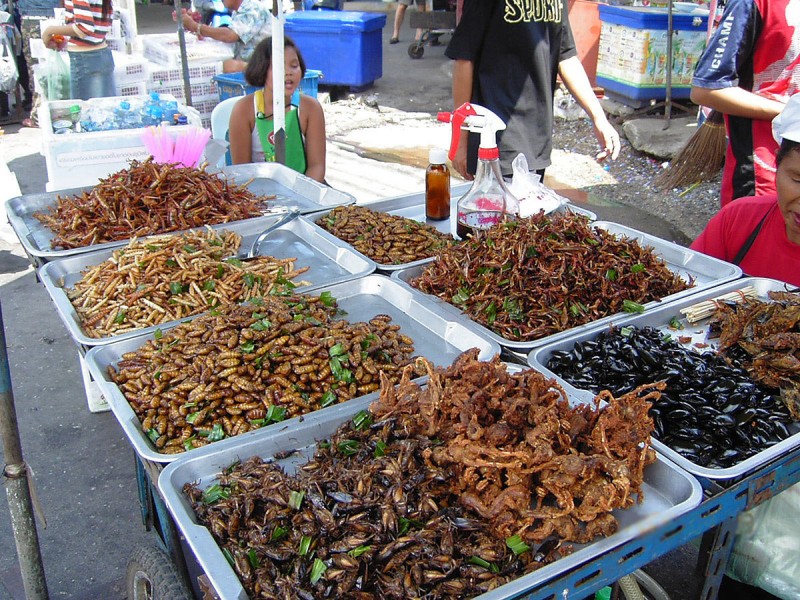
In a world facing the challenges of climate change, resource depletion, and food insecurity, finding sustainable and alternative food sources has become paramount. One such intriguing option gaining popularity is entomophagy, the practice of consuming insects as food. While it may be a novel concept to some, entomophagy has a long history and holds significant promise for addressing global food challenges. This article explores the fascinating world of entomophagy, shedding light on why insects are considered a sustainable food source, examining their nutritional value, cultural significance, and the benefits they offer for both the environment and human health.
The History of Entomophagy
Entomophagy is not a recent trend; in fact, it dates back thousands of years. Many ancient civilizations, including those in Africa, Asia, and Latin America, incorporated insects into their diets as a regular food source. Native communities in these regions continue to enjoy the nutritional benefits of insects as part of their traditional cuisine.
Why Insects are a Sustainable Food Source
Low Environmental Impact
Unlike traditional livestock farming, which requires vast amounts of land, water, and resources, insect farming has a significantly lower environmental footprint. Insects are highly efficient at converting feed into edible mass, and they produce fewer greenhouse gases and waste.
High Nutritional Value
Insects are rich in essential nutrients such as protein, healthy fats, vitamins, and minerals. They often outperform conventional meat sources in terms of nutritional content, making them an excellent alternative for combating malnutrition.
Efficient Resource Utilization
Insect farming requires minimal resources compared to traditional livestock. For instance, crickets can thrive on organic waste materials, making them an eco-friendly solution to food waste management.
Edible Insects Around the Globe
Crickets: The All-Purpose Insect
Crickets are among the most popular and widely consumed edible insects globally. They have a mild nutty flavor and can be easily incorporated into various dishes, such as protein bars, snacks, and even cricket flour.
Silkworms: A Delicacy in Asia
Silkworms are not only known for their silk-producing abilities but are also a delectable food source in many Asian countries. They are often enjoyed boiled, fried, or in soups.
Mealworms: Versatile and Tasty
Mealworms are another widely accepted insect in the culinary world. They have a slightly nutty taste and are frequently used in baking, cooking, and even as a crunchy topping for salads.
Overcoming the Western Stigma
Despite the historical and cultural acceptance of entomophagy in various regions, the Western world has been slow to embrace the idea of consuming insects as food. The cultural perception of insects as pests has created a stigma around eating them. However, with increasing awareness of sustainability issues, efforts are underway to promote entomophagy in the West.
Cultural Perceptions of Insects as Food
In Western societies, insects have long been associated with uncleanliness and disease, making them an unappealing food option for many.
Promoting Entomophagy in the West
To overcome the stigma, education and awareness campaigns highlighting the environmental and health benefits of entomophagy are being conducted. Culinary events featuring insect-based dishes are gaining traction, helping people become more open to the idea.
Entomophagy and Global Food Security
Insects as a Solution to Food Scarcity
As the global population continues to grow, traditional food production may struggle to meet the increasing demand. Insects offer a solution by providing a sustainable and abundant food source.
The Role of Insect Farming
Insect farming has the potential to alleviate food shortages in regions where conventional agriculture faces challenges. Insects can be bred and harvested quickly, making them an ideal candidate for mass production.
Cooking with Insects: Culinary Delights
Insect Snacks: A Growing Trend
Insect snacks, such as cricket chips and roasted mealworms, are gaining popularity in health-conscious communities. These snacks offer a sustainable and protein-packed alternative to traditional potato chips.
Insects in Gourmet Cuisine
Renowned chefs are experimenting with insect-based ingredients to create unique and innovative gourmet dishes. The delicate flavors and textures of certain insects can elevate a dish to a whole new level.
Incorporating Insect-Based Ingredients
Insect-based ingredients, such as cricket flour or silkworm pupae, are finding their way into various food products like pasta, energy bars, and protein shakes.
The Ethical Debate: Insects vs. Traditional Livestock
Insect Farming vs. Factory Farming
Compared to traditional livestock farming, insect farming is generally more humane and less exploitative of animals.
Animal Welfare Considerations
The ethical dimension of entomophagy is a subject of ongoing debate. While some argue that insects' simpler nervous systems make their farming more ethical, others believe that all living creatures deserve respect and consideration.
Addressing Health and Safety Concerns
Allergies and Precautions
As with any food, some individuals may have allergies to specific insects, necessitating cautious consumption.
Regulation and Standardization
To ensure the safety and quality of insect-based food products, regulations and standardized practices for insect farming and processing are being developed.
Entomophagy in Ecological Conservation
Preserving Biodiversity
Incorporating insects into our diets may reduce pressure on traditional livestock, which often leads to deforestation and habitat destruction.
Insects as Pollinators
Many insects, such as bees, play a vital role in pollination. By incorporating insect-based foods, we indirectly support the conservation of these essential pollinators.
The Future of Entomophagy
Innovations and Research
Scientists and entrepreneurs are continually researching insect-based food products and farming methods to improve sustainability and appeal.
Integration into Mainstream Diets
As entomophagy gains momentum, it is likely to become a more prominent feature of mainstream diets, providing a sustainable solution to global food challenges.
The world of entomophagy presents a fascinating and viable solution to the growing global challenges of food sustainability and security. By embracing the consumption of insects, we can promote sustainable practices, conserve resources, and improve nutrition worldwide. As societies become more open to the idea, entomophagy has the potential to revolutionize our relationship with food and lead us towards a more sustainable and resilient future.
The Surprising World of Microbes: How Tiny Organisms Shape Our Lives
Unconventional Careers: Exploring Exciting Job Opportunities You Might Not Know About